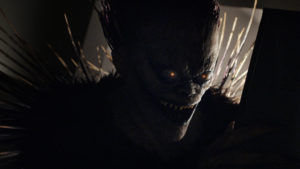REVIEW | Netflix’s ‘Death Note’
Distributor: Netflix
Production Company:
Directed by: Adam Wingard
Written by: Charley Parlapanides, Vlas Parlapanides and Jeremy Slater
Starring: Nat Wolff, Lakeith Stanfield, Margaret Qualley, Willem Dafoe
Light Turner, a bright student, stumbles across a mystical notebook that has the power to kill any person whose name he writes in it. Light decides to launch a secret crusade to rid the streets of criminals. Soon, the student-turned-vigilante finds himself pursued by a famous detective known only by the alias L.
A killer notebook and Willem Dafoe reprising his role as the Green Goblin (kinda).
101 minutes
August 25, 2017
 On Friday, Netflix dropped Death Note, a live-action film adaptation of the popular manga/anime of the same name. Since I was free for most of Sunday afternoon, with no plans besides counting down the hours until the seventh season finale of Game of Thrones, I figured I may as well check it out. After all, it was something I was looking forward to, despite the valid whitewashing criticism.
On Friday, Netflix dropped Death Note, a live-action film adaptation of the popular manga/anime of the same name. Since I was free for most of Sunday afternoon, with no plans besides counting down the hours until the seventh season finale of Game of Thrones, I figured I may as well check it out. After all, it was something I was looking forward to, despite the valid whitewashing criticism.
Before you read through my review, please keep in mind, I haven’t read the manga version of Death Note, nor watched a single episode of the anime series. I’m merely critiquing the Netflix movie on its own merits.
Also, while I’m not going to outright give away the ending, I do make references to certain plot points of the film, which may be spoilers for anyone who hasn’t seen it yet. So proceed with caution.
Death Note focuses on Light Turner, a smart high school kid who doesn’t seem to have any friends. His mother was recently killed, leaving just him and his cop father, a dynamic which causes a rift in their relationship. His mother’s killer walked away from the charges and Light doesn’t feel his father pursued the killer hard enough. One day, during a freak storm, Light finds a notebook, the Death Note, which grants the user the ability to kill anyone whose name is written on its pages. There are a bunch of rules associated with the Death Note but it all boils down to “killer notebook.”
Along with his girlfriend Mia, Light (I can’t believe this is the kid’s name) goes on a killing spree. They target bad guys and people who hurt others in an effort to “better the world.” In the process of their murders, they attribute the killings to a karma god of sorts, whom they name Kira, as a way to strike terror into the hearts of evil-doers.
 The murders attract the attention of L, an eccentric detective who is fueled by candy and often forgets to sleep. Being a sugar addict seems like an odd character trait to give a prominent character so I assume that this was a carry-over from the source material, but it really seems out of place. The film tried to explain it with an off-hand remark about the “insulin rush” but the trait doesn’t seem natural. In a long form narrative, like the manga or the anime, a quirk like this can developed and also used as a detriment to the character, such as when he’s in a situation lacking sugar. The movie, however, just shoehorns it in with very little (if any) explanation, so it comes off as silly.
The murders attract the attention of L, an eccentric detective who is fueled by candy and often forgets to sleep. Being a sugar addict seems like an odd character trait to give a prominent character so I assume that this was a carry-over from the source material, but it really seems out of place. The film tried to explain it with an off-hand remark about the “insulin rush” but the trait doesn’t seem natural. In a long form narrative, like the manga or the anime, a quirk like this can developed and also used as a detriment to the character, such as when he’s in a situation lacking sugar. The movie, however, just shoehorns it in with very little (if any) explanation, so it comes off as silly.
Then there’s Mia, Light’s girlfriend. She’s the guiding force in Light’s usage of the Death Note, a girl with a dark side that she hides from the rest of the world… except the movie makes the audience aware that she is the “bad girl” from the minute we first see her. She’s smoking a cigarette at cheerleading practice, for example, so clearly she’s edgy. The problem is that Mia has no depth. We never get a glimpse at her past, or at her home life to really understand why she’s so messed up. She is 100% gung-ho about using the Death Note, to the point of threatening Light’s life to convince him to give it to her but it’s never clear why. She’s deeply disturbed and would make for a fascinating character study, but unfortunately she’s used as a side note, only meant to push Light further and further to see how far he’ll go.
My main problem with the film is how easily all of the characters accept the idea of the supernatural being involved in the murders. Light’s cop father wastes no time coming to the conclusion that his son is Kira despite the physical impossibility for him to be so. Even L, with all his grand detective skills, fingers Light early on as the culprit, assuming he has some sort of latent telepathic abilities that allow him to control and kill people.
This wouldn’t be a big deal if the movie established itself as part of a world where this sort of this was commonplace. A few references to some of L’s past cases that document criminals with telepathy or whatnot would go a long way here. From everything we’re shown, however, the viewer has to assume that the film takes place in our world where the laws of physics apply. Yes, Light has a magic book that can kill people but that’s the outlier, not the natural order. If L had been shown to be chasing this book for a decade and realized that it found its way into Light’s hands, his deductions would make sense. But L, from what we’re shown, doesn’t know about the book’s existence and still manages to guess almost every rule. It’s implausible and makes the movie hokey.
 I also had a really difficult time figuring out who I should be rooting for. We get why Light has a hard time with life: his mother is killed, her killer buys himself out of a prison sentence, and he has to deal with bullies at school. So when he gets the Death Note and he’s able to turn everything around, his first act is to kill a classmate. It’s a little out there and doesn’t do much to establish himself as a “good guy.” When it comes to L, the guy who is trying to find justice and stop these murders, we never really connect with him. He is so quirky and abstract that it’s hard to find common ground, so despite his intentions, we don’t really care if he wins or not. It isn’t until he suffers a major loss do we see him exhibit any kind of emotion, and by then it’s too late into the film for the audience to really connect with the character.
I also had a really difficult time figuring out who I should be rooting for. We get why Light has a hard time with life: his mother is killed, her killer buys himself out of a prison sentence, and he has to deal with bullies at school. So when he gets the Death Note and he’s able to turn everything around, his first act is to kill a classmate. It’s a little out there and doesn’t do much to establish himself as a “good guy.” When it comes to L, the guy who is trying to find justice and stop these murders, we never really connect with him. He is so quirky and abstract that it’s hard to find common ground, so despite his intentions, we don’t really care if he wins or not. It isn’t until he suffers a major loss do we see him exhibit any kind of emotion, and by then it’s too late into the film for the audience to really connect with the character.
So who do we root for? The down-on-his-luck killer or the eccentric detective?
 Death Note was directed by Adam Wingard, who is best known for V/H/S and for surprising everyone in 2016 with a new Blair Witch movie. I like Wingard as a director but he seemed to miss the mark with Death Note. The movie is remarkably directed and looks fantastic but really suffers from all of the logical and character inconsistencies in the script. I feel like there was definitely the possibility of a good movie, especially given the depth of the source material, but lacked the proper execution.
Death Note was directed by Adam Wingard, who is best known for V/H/S and for surprising everyone in 2016 with a new Blair Witch movie. I like Wingard as a director but he seemed to miss the mark with Death Note. The movie is remarkably directed and looks fantastic but really suffers from all of the logical and character inconsistencies in the script. I feel like there was definitely the possibility of a good movie, especially given the depth of the source material, but lacked the proper execution.
The cast did a great job with what they were given. Nat Wolff, who played Light, really felt like a lost, angry child, mad at the world for everything that happened to him. Wolff brought a lot of energy and emotion to the role and makes the character likeable despite the terrible things he does. Juxtaposed with that, Lakeith Stanfield as L made a great foil. His delivery as the stoic, brilliant detective drew that divide between the character and the audience, which made it so effective when the character hit his emotional breaking point. As a viewer, I felt his sadness and his rage, and enjoyed the way this emotion mirrored Light’s own, making them two sides of the same coin, of sorts.
 Even Margaret Qualley was fantastic as Mia. Though the character has the least depth of the cast, she’s a driving force to the story. Qualley plays the role with a certain coolness, almost emotionless. It makes the audience wonder if our opinion of the character is wrong or if she truly is a sociopath. Which is a great take considering how little backstory we get of the character.
Even Margaret Qualley was fantastic as Mia. Though the character has the least depth of the cast, she’s a driving force to the story. Qualley plays the role with a certain coolness, almost emotionless. It makes the audience wonder if our opinion of the character is wrong or if she truly is a sociopath. Which is a great take considering how little backstory we get of the character.
One of the highlights of Death Note, though, was Willem Dafoe as the voice of the demon Ryuk. Dafoe never shows up on screen but he brings life, ironically, to the death demon. His performance is reminiscent of his take on the Green Goblin in 2000’s Spider-Man, which I liked. He added a lot to a character that spends most of the movie shrouded in shadows and gives the audience something to grasp.
A Death Note film like this was a huge undertaking, considering it needed to boil down 37 episodes of the source anime into a 100 minute feature. Despite its missteps, the cast and crew did the best they could, unfortunately that didn’t make for a wholly great finished project. It’s the kind of movie to watch on a lazy weekend, or when you’re home sick hopped up on Nyquil. While it captures the dichotomy of doing bad things for good reasons, it doesn’t really explore those themes and just comes off as a superficial revenge story. Though I really did enjoy the final scene and the open-ended finale, I feel like all I really got out of this movie is the desire to watch the anime in the hopes of finding a good, complete story.
Grade: C
- Some cool action sequences
- A thrilling ending
- Little to no character development
- Character traits are laughable quirks
















